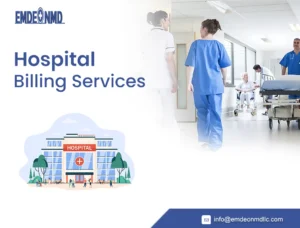Revenue cycle management RCM is considered as the prime component in the coding of medical services for timely reimbursements of payments by the insurance company.RCM is crucial in billing for maintaining financial stability along with lowering risks of denials and rejections of insurance claims. Mastering revenue cycle management RCM can significantly impact the billing and coding of medical services. Effective RCM is used regularly in the company, to optimize cash flow.
Are you someone who wants to get details about RCM? How could it be mastered? This blog post gives a comprehensive overview of the revenue cycle management with a detailed explanation of strategies and components of RCM.Do you know what revenue cycle management RCM is? RCM stands for revenue cycle management, which is termed as financial procedures in which the tracking of patient care episodes, initiating from appointment till payment collection, is used by healthcare providers
Components of Mastering RCM
Mastering revenue cycle management RCM is dependent on some key factors that make it up to mark, working cordially to manage cash flow, billing, and reimbursements of claims effectively. Some main components of RCM include:
Pre-registration and registration
It is considered as the first and prime stage in revenue cycle management RCM in which pre-registration refers to gathering patient demographic, insurance, verification, and prior authorization, along with estimates of copays and deductibles. Pre-registration is done before the visit to the physician. While registration is required to be done during visits in which primary or secondary insurance holders, along with insurance details, are being discussed. During registration, regulatory compliance like HIPAA, financial responsibility, and authorization is ensured by signing the respective consent form.
Both pre- and in-process registration are significant components of medical coding and billing; without these, any patient is not liable for the provision of medical services followed by reimbursement of offered services. These are crucial in the prevention of claims from rejection or denials due to incorrect insurance details that improve patient trust by clear expectations and successful reimbursements. Further, it lowers administrative burden, thus preventing billing delays and ensuring timely submission.
Charge capture and medical coding
Charge capture is the second stage of RCM, followed after the registration process, referred to as provision of coding of medical services that are offered by respective healthcare providers, followed by billing of medical services. It is responsible for billing procedural tests, treatment, follow-ups, ups, and consultations, ensuring non-missed services by the help of an advanced electronic health record EHR system, and also ensuring the submission of accurate and valid patient documentation before the final submission of charges. Medical coding is a sub-component of RCM in which the specific services and treatment are converted into codes such as ICD-10, CPT, HCPCS codes for reimbursements of insurance claims.
Claim submission and management
Medical coding and charge capture is followed by submission of claims and denial management. Claim submission includes submission of accurate and error-free claims checked by clearing houses, ensuring payer-specific format, complaint to regulatory rules such as the coding guidelines provided by CMS in case of Medicare services. Claim submission can be promoted for faster processing by EDI systems usage. Claim management ensures proper tracking through advanced RCM software to avoid delays, analyzing errors, and denials, followed by resubmission of rejected claims. Claim denials and payment delays are the most common problem in RCM. Effective claim submission and management can reduce this risk.
Payment posting and patient billing
Payment posting refers to the recording of payments received from insurance companies or patients responsible for ensuring the accuracy of underpayment, overpayments, discrepancies, and denial detection in the process. It is mainly responsible for:
- Accurate and timely payment of government programs like Medicaid, Medicare, or insurance payers
- Remittance advice processing for matching payment to the respective claim
- Tracing of contractual adjustments like discounts or waivers, write-off, pending payments
- Identification and resolution of appropriate payments, non-covered services or incorrect reimbursements
- Ensure clear and understandable bills
- Provision of an instalment for managing expenses
- Provision of secure online portals for faster payments of medical services
Collections and follow up
Payment collection is concerned with analysis of unpaid claims, by tracking aging reports for overpayments, and ensures follow up of submitted claims for unpaid or underpaid claims by contacting insurance companies. In case of a rejected claim, recession is to be done along with the supporting documents for approval and reimbursements. For efficient collection, payment reminders can be sent in the form of texts, emails, or others, in which payment deadlines and implementation of the payment policy is a must in RCM. Engagement of collection agencies if failure occurs in multiple attempts of collection of payments.
Financial reporting and analysis
Financial reporting and analysis is prime and major component of RCM, it includes revenue cycle KPIs and reporting followed by financial performance analysis in which key performance indicator KPIs acts analytical indicator for analysis of RCM performance and detection of its efficiency for detection of improvements required. Most common KPI includes:
- Days sales outstanding (DSO)
- Clean claim rate (CCR)
- Denial rate
- Collection ratio
- Account receivable (AR)aging
These common KPIs helps in analyzing financial performance, crucial in comparing revenue trends, helps in regular monitoring of billing, coding, collection, and reimbursement of services, further assisting in pricing optimization along with contact negotiation with other parties.
Continuous Improvement and staff training
RCM can be mastered by having a check and balance on all components, in which professional staff can play a crucial role in efficient RCM and management. Staff can be trained regularly regarding the latest regulatory guidelines, advanced technologies, along with denial management workshops, which can help in accurate revenue cycle management of the medical service.
Final word
Do you know that services and patient-friendly billing practice can foster transparency and trust of the client, this can be achieved by opting Emdon MD with a vision to provide trustworthy and complaint medical services to the client under professional and expert umbrella with provision to assure cooperative environment with our team through free consultation available on our official website.












1 thought on “A Comprehensive Overview to Mastering Revenue Cycle Management (RCM)”
Pingback: Understanding Super Bills in Medical Billing: Key Insights